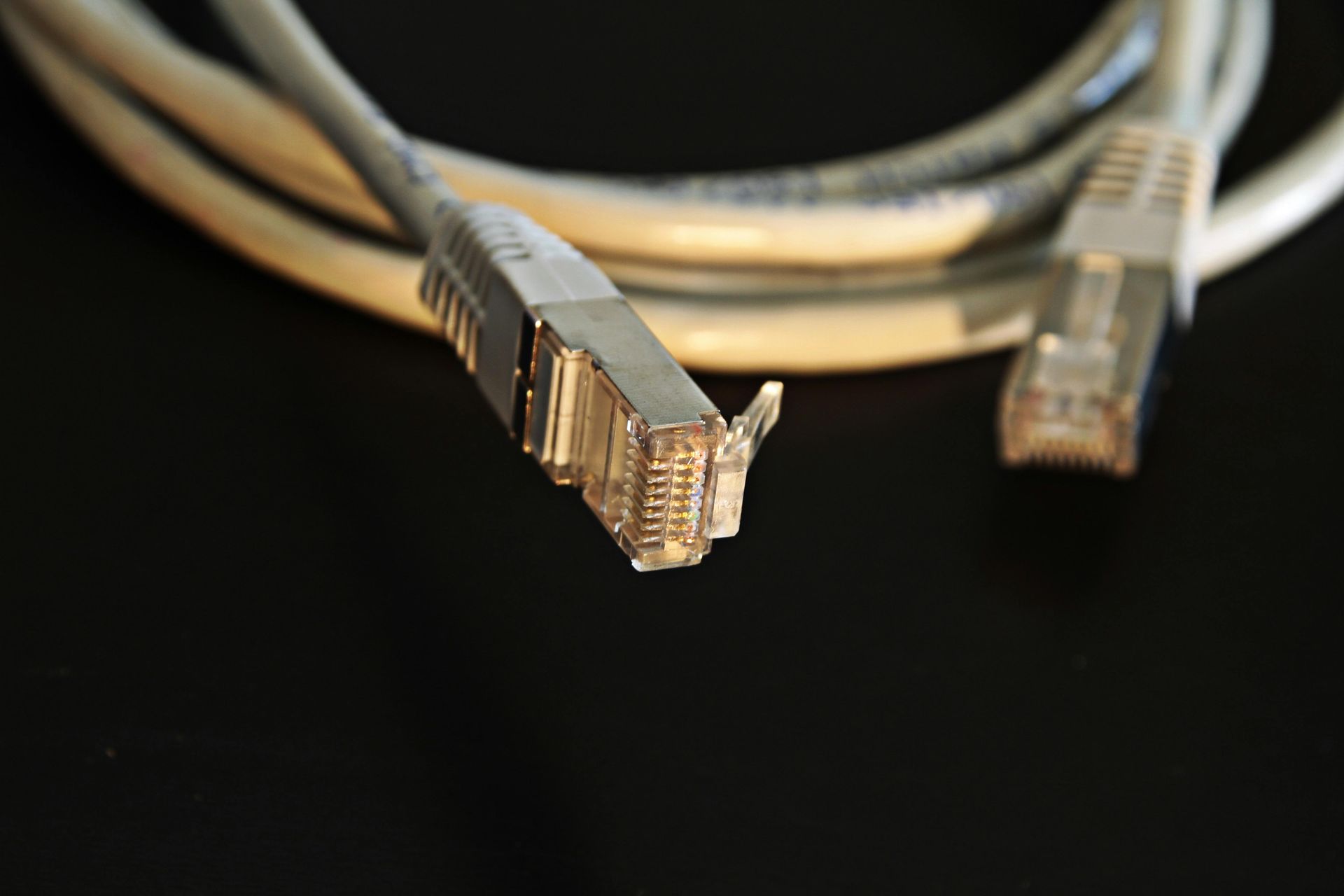How Fiber-Optic Internet Provides a More Secure Connection Than Copper Cables

In today’s digital landscape, businesses need more than just a fast internet connection—they need a secure one. With cyberattacks on the rise and data breaches becoming more common, a company's choice of internet infrastructure can play a crucial role in protecting sensitive information. While many businesses still rely on traditional copper cables, fiber-optic internet offers a much more secure alternative. Its unique construction and transmission method make it inherently resistant to many of the vulnerabilities that copper-based systems face. Let’s explore why fiber-optic internet is the better choice for businesses that prioritize data security.
Understanding Fiber-Optic Technology vs. Copper Cables
Fiber-optic and copper cables serve the same fundamental purpose: transmitting data. However, the way they achieve this is entirely different. Copper cables use electrical signals to carry information, which makes them more vulnerable to interference and physical tapping. Fiber-optic cables, on the other hand, use light pulses to transmit data through strands of glass or plastic fibers. This difference in transmission method has significant implications for security.
With fiber-optic cables, data travels as light signals that pass through thin glass fibers. This makes it nearly impossible to intercept the data without physically cutting into the cable, which would immediately disrupt the signal. In contrast, copper cables emit electromagnetic signals that can be detected and tapped into with relative ease. This difference makes fiber-optic internet a more secure choice, especially for businesses that deal with sensitive data.
The Security Risks of Copper Cables
Copper cables, while once the standard for internet connections, come with several security risks that are increasingly problematic in today's cyber-threat landscape. One of the most significant vulnerabilities is the ease with which copper cables can be tapped. Hackers can intercept data by simply accessing the electromagnetic signals emitted by the cable. This makes copper-based networks more susceptible to eavesdropping, where unauthorized parties gain access to sensitive communications and data.
Another issue with copper cables is their susceptibility to electromagnetic interference (EMI). Copper cables can pick up stray signals from nearby electronic devices, which can cause data leakage and network instability. In environments with heavy machinery or industrial equipment, the risk of data corruption due to EMI is even higher. These weaknesses make copper less suitable for businesses that cannot afford to compromise on data security.
There have been instances where businesses suffered data breaches due to vulnerabilities in their copper-based networks. For example, companies in the financial and healthcare sectors, where data confidentiality is paramount, have faced serious consequences when data was intercepted through their less secure internet infrastructure. These risks highlight the need for a more secure alternative—one that fiber-optic technology can provide.
Why Fiber-Optic Internet is More Secure
Fiber-optic cables are not just faster; they are fundamentally more secure than copper cables. One of the key reasons is that tapping a fiber-optic cable is much more difficult. Unlike copper, where a simple wiretap can intercept the electrical signals, fiber-optic cables require cutting into the fiber strands to access the light pulses carrying data. This intrusion causes a noticeable disruption in the signal, making it easy to detect any attempts at tampering.
Moreover, fiber-optic cables are immune to electromagnetic interference. Because they use light to transmit data, they do not emit any electromagnetic signals that could be picked up by nearby devices. This feature makes fiber-optic networks ideal for businesses operating in environments with heavy electronic activity or those that require secure data transmissions over long distances.
For industries like healthcare, finance, and legal services—where protecting client information is not only a priority but a regulatory requirement—fiber-optic internet provides an added layer of security. The ability to detect physical intrusions quickly means that businesses can respond to threats faster, preventing potential data breaches. A simple comparison between the two technologies reveals that fiber offers both better speed and more robust security, making it the superior choice for modern businesses.
Fiber-optic cables offer a high level of security compared to copper cables. Their resistance to tapping is strong, as any physical interference cuts the signal, making unauthorized access easily detectable. In contrast, copper cables can be easily tapped without immediate detection. Fiber-optic cables are also immune to electromagnetic interference, ensuring a secure data flow, while copper cables are more vulnerable to such interference, which can lead to data leakage. Data in fiber-optic systems travels through light pulses within glass fibers, whereas copper cables rely on electrical signals, making fiber a more secure option for data transmission.
Additional Security Benefits of Fiber for Businesses
Beyond its resistance to tapping and interference, fiber-optic internet offers other security benefits that make it ideal for businesses. One major advantage is its ability to support advanced encryption methods without sacrificing speed. High-speed connections allow for more robust encryption algorithms, which are essential for protecting sensitive data during transmission. This means businesses can secure their communications and transactions while still enjoying the fast speeds that fiber provides.
Fiber-optic internet is also a strong foundation for Virtual Private Networks (VPNs). A VPN creates a secure tunnel for data to travel through, making it much harder for unauthorized parties to access it. With fiber’s high speeds and low latency, businesses can maintain secure, encrypted communication channels without experiencing slowdowns, even when employees are working remotely. This capability has become increasingly important as more companies adopt remote work models.
Additionally, fiber’s reliability contributes to security by reducing the risk of accidental data loss during service outages. Unlike copper cables, which can suffer from frequent disruptions, fiber-optic networks provide a stable connection. This stability means that sensitive data is less likely to be lost or corrupted due to sudden drops in connection quality.
Case Study: A Business Enhanced Its Security with Fiber-Optic Internet
To understand the real-world impact of fiber-optic internet on security, consider the case of a regional law firm that upgraded from copper-based broadband to fiber-optic internet. Before the switch, the firm faced multiple security challenges, including frequent data loss during service interruptions and concerns about data interception due to the vulnerabilities of copper cables.
After transitioning to fiber, the firm saw immediate improvements. The new fiber connection provided a more stable and secure network, reducing the likelihood of unauthorized access. The firm also implemented a secure VPN, which performed better with the high speeds of fiber. This allowed lawyers to securely access client files from remote locations without risking data breaches.
The upgrade not only improved data security but also helped the firm comply with strict data privacy regulations. By choosing fiber-optic internet, the firm could assure clients that their sensitive information was being handled with the utmost care, strengthening client trust and providing a competitive advantage in a security-conscious market.
The Role of Fiber in Regulatory Compliance
For businesses that must comply with data protection regulations such as GDPR, HIPAA, or CCPA, using a secure internet connection is essential. Fiber-optic internet can play a key role in meeting these compliance standards, as its robust security features help safeguard personal and financial information.
Data protection regulations often require businesses to take all reasonable steps to secure sensitive information. By investing in a fiber-optic network, businesses demonstrate their commitment to protecting customer data, which can be a significant factor during regulatory audits. Fiber’s ability to support secure data transfer protocols also ensures that sensitive information remains protected when shared across the network.
For companies in industries like healthcare, where data breaches can result in hefty fines and loss of trust, using fiber-optic internet can provide peace of mind. It allows them to maintain secure communication channels and ensures that their network infrastructure is not a weak link in their data protection strategy.
Conclusion
Fiber-optic internet provides more than just faster speeds—it offers a level of security that traditional copper cables cannot match. From its resistance to physical tapping and electromagnetic interference to its support for advanced encryption methods, fiber ensures that data remains secure during transmission. For businesses that handle sensitive information or must comply with stringent data protection regulations, the security advantages of fiber-optic internet are clear.
If your business is ready to prioritize security and protect its digital assets, consider upgrading to fiber-optic internet. By choosing a more secure connection, you can safeguard your operations against cyber threats and ensure that your customers' trust remains well-placed.
